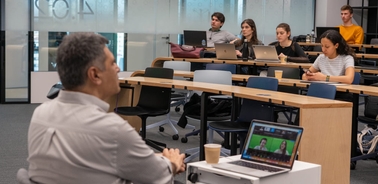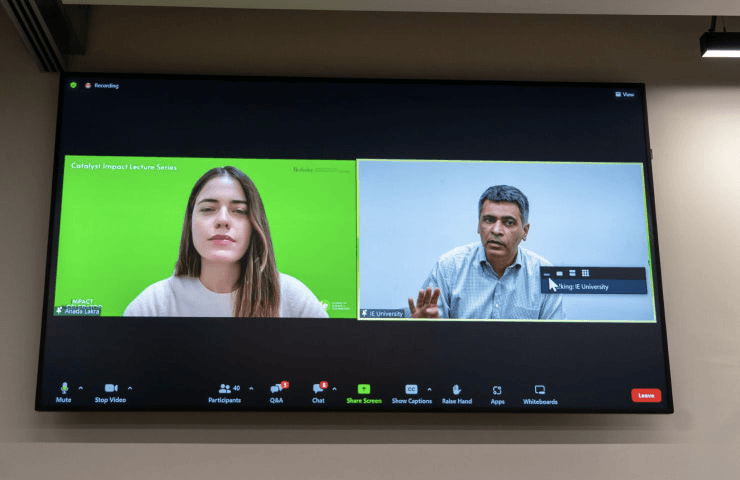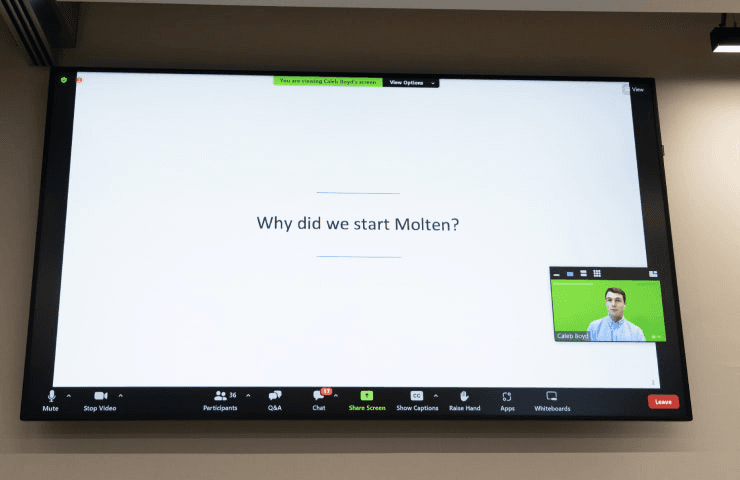Fourth Catalyst Impact Lecture Unpacked The Potential of AI For Accents and The future of Clean Energy

IE and UC Berkeley invited CEO of BoldVoice, and CTO of Molten Industries to share insights on AI for accents, and clean energy.
At the fourth session of the Catalyst Impact Lecture Series, hosted by the IE School of Science and Technology and UC Berkeley's Sutardja Center, two game-changing technologies took center stage: Artificial Intelligence for accents and innovation in clean energy.
Anada lakra, CEO of BoldVoice, and Caleb Boyd, CTO of Molten Industries, examined the use of AI in accent training, and clean energy in heavy industries, respectively.
While the former session partly dealt with the use of AI for voice recognition, the first segment of this lecture tackled its application for accents.
Studies show that a foreign accent can reduce one's likelihood of being hired or being promoted. That was the experience of Lakra’s parents when they immigrated to the United States. Even Lakra was constantly asked to repeat herself when she started college at Yale University. She then co-founded BoldVoice, “an English solution for immigrants by immigrants,” as she described it.
Boldvoice uses speech AI to detect the slightest mistakes in pronunciation and offers sound-by-sound corrections. The algorithm is modeled after how their Hollywood accent coaches train their clients.
Anada distinguished herself as the business founder and highlighted that her partner, the CTO, takes a lead role in the technical aspects of the company. When asked about the value she brings to such a tech-venture, she responded that her focus on the consumer experience because “BoldVoice is not just building a speech model, it’s a company that brings a solution to an end-user.”
Finally, to answer a student’s question about how to enter the very competitive AI world, she advised to “start with what is already out there and accessible. Don’t reinvent the wheel.”
The second part of this Catalyst Episode presented Molten Industries’ technological solution to help prevent climate change. How? By producing clean hydrogen without excessive energy consumption.
Caleb Boyd, co-founder and CTO of Molten explained the potential of green hydrogen to decarbonize heavy industries and reach net zero. Molten identified a significant gap in the industries lacking viable and scalable solutions to achieve net-zero emissions, representing a missed opportunity for progress. Thus, they came up with a solution that started in a garage at Stanford and is now the cleanest way to produce such a widely-used element.
When asked, by a student, about how Molten managed to cut the cost of producing hydrogen, Boyd explained that they use renewable electricity to crack methane into hydrogen and solid carbon- a beneficial by-product used in concrete, paints, plastics and tires. “The carbon that we make is an asset instead of a liability” he stated.
Asking about Molten's long-term plan for hydrogen, one student wondered, "Will it be the best alternative we have or there is a lot to explore?" Boyd responded by stating, "Hydrogen is going to be a piece of a much larger puzzle of decarbonization technologies [...] not the only solution." He mentioned many alternatives that green hydrogen could collaborate with, including direct air capture of carbon dioxide, the use of enzymes for bio-based chemicals and feed-stocks, electrification, and so forth.

